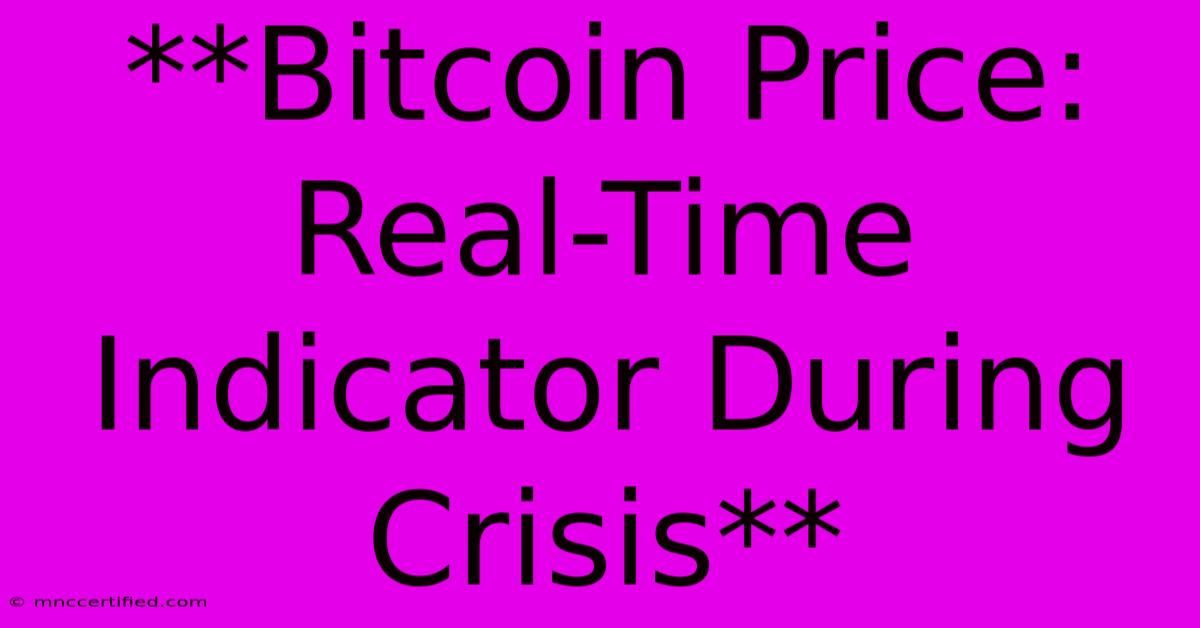**Bitcoin Price: Real-Time Indicator During Crisis**

Table of Contents
Bitcoin Price: Real-Time Indicator During Crisis?
The world of finance is constantly shifting, and during times of crisis, investors often turn to alternative assets like Bitcoin for safety and potential profit. While some argue Bitcoin is a digital gold, others see it as a volatile speculative asset.
One intriguing aspect of Bitcoin is its potential as a real-time indicator of global economic sentiment. In this article, we explore the correlation between Bitcoin's price fluctuations and major economic events, examining its role as a crisis barometer.
Bitcoin's Price Volatility: A Double-Edged Sword
Bitcoin is notorious for its price volatility. This inherent characteristic can be both a blessing and a curse. During periods of market uncertainty, Bitcoin's price can surge rapidly, reflecting investor sentiment and the perceived value of decentralized digital assets.
Consider the following:
- COVID-19 Pandemic: During the initial stages of the pandemic, traditional markets crashed, and Bitcoin initially dipped as well. However, it quickly rebounded and continued to climb throughout 2020, suggesting investors saw Bitcoin as a safe haven amidst the global economic chaos.
- War in Ukraine: The ongoing war in Ukraine caused significant market turmoil. Bitcoin's price again experienced volatility, demonstrating its sensitivity to geopolitical events.
Bitcoin's Correlation to Traditional Markets
While Bitcoin is often touted as an independent asset, its price movements are not entirely detached from traditional markets. When global stock markets decline, Bitcoin can sometimes follow suit, indicating a broader shift in risk appetite.
However, the correlation isn't always straightforward. There are instances where Bitcoin has decoupled from traditional markets, demonstrating its unique characteristics.
For example:
- Quantitative Easing (QE): During periods of QE, when central banks inject liquidity into the market, Bitcoin's price has historically risen. This suggests investors may see Bitcoin as a hedge against inflation and currency devaluation.
Bitcoin as a Crisis Barometer?
Based on the evidence, Bitcoin can serve as a potential early indicator of economic sentiment during times of crisis. Its volatility and potential for rapid price movements can reflect changing investor risk appetite and the perceived value of decentralized assets.
However, it's crucial to understand the limitations:
- Lack of Historical Data: Bitcoin is a relatively new asset, and its track record during major crises is limited.
- Multiple Influencing Factors: Bitcoin's price is influenced by various factors, including regulatory developments, technological advancements, and market speculation.
- Volatility and Speculation: Bitcoin's inherent volatility can lead to price fluctuations that are not necessarily reflective of broader economic trends.
Conclusion: Navigating the Crypto Landscape
Bitcoin's role as a real-time indicator of economic sentiment during crisis remains a topic of ongoing debate. While its price movements can provide valuable insights, it's essential to view them with caution and consider the broader context.
Investors should carefully evaluate their risk tolerance, understand the complexities of the cryptocurrency market, and conduct thorough research before investing in Bitcoin or any other digital asset.
Remember, Bitcoin is a speculative asset with inherent risks. Don't solely rely on its price movements as a primary indicator for economic forecasting.

Thank you for visiting our website wich cover about **Bitcoin Price: Real-Time Indicator During Crisis** . We hope the information provided has been useful to you. Feel free to contact us if you have any questions or need further assistance. See you next time and dont miss to bookmark.
Featured Posts
-
New York Man Arrested Accused Of Terror Support
Nov 07, 2024
-
Nasdaq Notification Received By Linkage Global
Nov 07, 2024
-
New York Lawmakers 4 Priorities Before Trumps Return
Nov 07, 2024
-
Magellan Financial And Insurance Services
Nov 07, 2024
-
Jd Vance Trumps Young Vp Pick
Nov 07, 2024